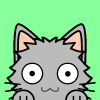المشاركات: 11
لغة: English
T0dd (عرض الملف الشخصي) 15 نوفمبر، 2012 1:57:56 ص
orthohawk:The Esperanto -A ending can mean either "characteristic of" or "pertaining to". In Ido, these two uses require different endings. So arba could mean either "treelike" or "pertaining to trees". Arba nubo is a cloud that looks like a tree, but arba besto is an animal that lives in trees. The reason la Zamenhofa traduko works, but la Johana ĉemizo doesn't, in my opinion, is that Zamenhof's translation is not only by him but also characteristic of him. Translations reflect something of the translator. A shirt, in contrast, simply belongs to someone, and that's the end of it. A true Johana ĉemizo might be a shirt of a type typically worn by and associated with Johano.hebda999:Not quite. A knaba broso is more like a "boy brush" i.e. used specifically for a boy (maybe it's the "manly looking" brush his daddy uses as opposed to the pink "girly" one his mom uses
The boy's brush is not as big as the bear's. / La knaba broso ne estas tiel granda kiel la ursa.
.) I would tend to think of an ursa broso as a brush made of bear bristles or as above, a brush used on a bear. Like a kata broso would be the brush you used to brush your cat. Not many people use the same brush on their own hair as the one they use to brush their cat

